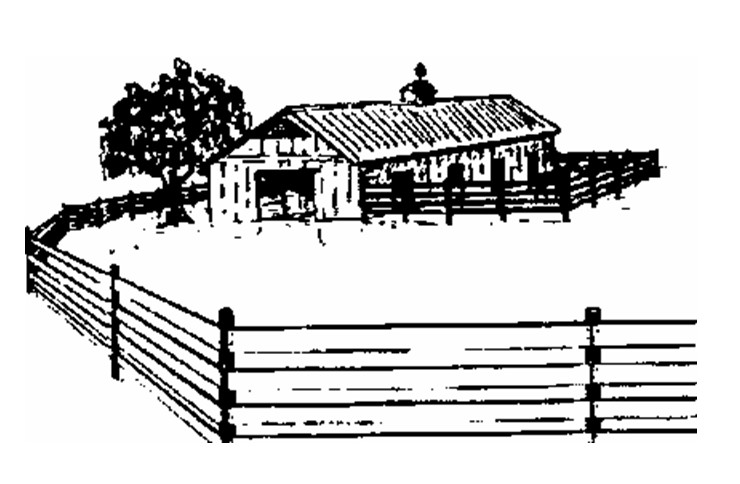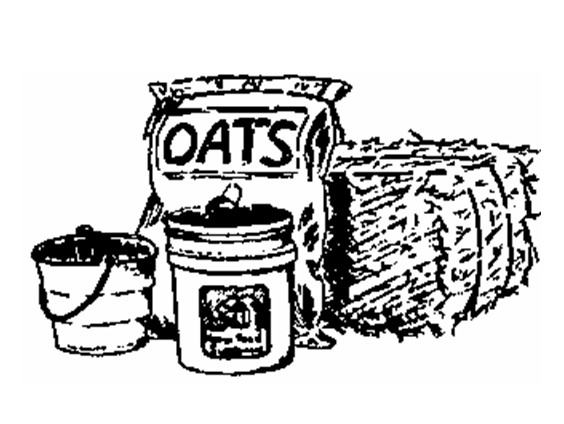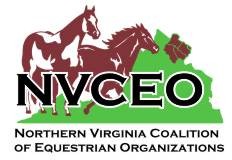Tips for the
New/Novice Horse Farm Owner
(By a New
Horse Farm Owner)
Provided by the Nokesville Horse
Society Newsletter
There are many people
who have had the good fortune to purchase horse property recently. Some of those people have been horse owners for a
long time and know exactly what to do on their new places. This
article is for those of you who are new farm owners that are just
starting out and may need some help. There is a big difference between
boarding your horse and doing it every day yourself. I bought a place
a short while ago and was thrilled to be taking care of my horses on a
day-to-day basis. I diligently fed, groomed and fly sprayed my horses
twice a day in this hot nasty weather. One day I noticed that my
horse's chest seemed to be peeling and he had scabs on his neck. I
used treatments that had worked in the past for boo-boos and skin and
fungal treatments and got lots of advice from friends, but it didn't
get better. Then I decided to ask for help from an older, wiser
horsewoman who finally figured it out. I was burning my horse with the
fly spray. All those years that I thought my horse was getting sprayed
- he wasn't. So now, after getting sprayed twice a day for a few weeks
- it was just too strong for him and the chemicals burned his skin. I
stopped spraying him everywhere except his legs - and his neck and
chest are almost healed. So be aware if your horse has sensitive skin,
you could be potentially harming him with frequent spraying. The 'spot
on' fly treatment might be the better choice for horses with sensitive
skin.
property recently. Some of those people have been horse owners for a
long time and know exactly what to do on their new places. This
article is for those of you who are new farm owners that are just
starting out and may need some help. There is a big difference between
boarding your horse and doing it every day yourself. I bought a place
a short while ago and was thrilled to be taking care of my horses on a
day-to-day basis. I diligently fed, groomed and fly sprayed my horses
twice a day in this hot nasty weather. One day I noticed that my
horse's chest seemed to be peeling and he had scabs on his neck. I
used treatments that had worked in the past for boo-boos and skin and
fungal treatments and got lots of advice from friends, but it didn't
get better. Then I decided to ask for help from an older, wiser
horsewoman who finally figured it out. I was burning my horse with the
fly spray. All those years that I thought my horse was getting sprayed
- he wasn't. So now, after getting sprayed twice a day for a few weeks
- it was just too strong for him and the chemicals burned his skin. I
stopped spraying him everywhere except his legs - and his neck and
chest are almost healed. So be aware if your horse has sensitive skin,
you could be potentially harming him with frequent spraying. The 'spot
on' fly treatment might be the better choice for horses with sensitive
skin.
 You
need to be careful not to overfeed your horses once that is one of
your daily chores. Most of us who have boarded in the past probably
wished we could care for own horse because they didn't seem to be
getting fed well enough. But it can be harmful to overfeed so you need
to watch the weight gain and try to keep your horses well fed but not
too fat. Also, beware of lush pastures. If your horse was not on good
grass before, it's a good idea to check their hooves every few days
for excessive heat and pounding digital pulse at the heels to make
sure they aren't getting ready to founder. I also called the vet and
asked her for a worming chart so I'd know what type of wormer to give
and when. She gave me a shot schedule as well. You can go to
www.getrotationright.com/barnchartgraphic.asp and get a FREE worming
chart mailed to you. I've had horses for 12 years but the barn manager
always made those decisions and now it's time for me to make these
decisions myself. You
need to be careful not to overfeed your horses once that is one of
your daily chores. Most of us who have boarded in the past probably
wished we could care for own horse because they didn't seem to be
getting fed well enough. But it can be harmful to overfeed so you need
to watch the weight gain and try to keep your horses well fed but not
too fat. Also, beware of lush pastures. If your horse was not on good
grass before, it's a good idea to check their hooves every few days
for excessive heat and pounding digital pulse at the heels to make
sure they aren't getting ready to founder. I also called the vet and
asked her for a worming chart so I'd know what type of wormer to give
and when. She gave me a shot schedule as well. You can go to
www.getrotationright.com/barnchartgraphic.asp and get a FREE worming
chart mailed to you. I've had horses for 12 years but the barn manager
always made those decisions and now it's time for me to make these
decisions myself.
After much research and phone calls, I finally found a reliable source
for gravel for my driveway and stone dust for my sacrifice area. Who
would have known how many different types of gravel and dust there are
and all the many uses? The person who is going to deliver gravel to my
place told me that pit find might be hard on my horse's feet. It has
large chunks of gravel mixed in with the dust as opposed to just
straight stone dust, which is what he recommends for setting up a dry
lot. For those of you who have pit find in their dry lots and have no
problem with it - great - do what works best for you. I am just
telling you what I heard and I have decided to use stone dust because
my horses don't wear shoes..
I have found that keeping your water trough in the shade during the
hottest summer months is a way to keep the algae from growing too
quickly. When the trough is in the hot sun all day it gets dirty a
whole lot faster and needs to be emptied and scrubbed out once a week.
When it's in the shade, the water stays cooler and it only needs to be
scrubbed out every two weeks. There are some people who seldom scrub
out their troughs and that's fine for them. I am one of those people
who like the water to be crystal clear so this is how I do it. Since
horses can drink up to 20 gallons of water a day in the summer, clean,
fresh water is important for their continued good health.
I have been at my new farm for about 6 weeks and have already made
many mistakes that I hope I have learned from. I jumped out of bed
every morning at 6 am the first few weeks, just thrilled to finally
have horses in the back yard. I still get up at 6 am to take care of
the horses but lately I'm more tired than thrilled. My husband and I
have spent most of our time mowing - makes me wish for winter. We
decided to get a four-wheeler for dragging the ring and plowing snow
and a lawn tractor for mowing. These decisions were based on advice
from friends and our dwindling budget and work very well on a small
place like ours, which is about 10 acres. We originally wanted about
15-20 acres and boy am I glad clearer heads told us that 10 would be
plenty. I will write another article in the fall to let you know all
the things I've been doing wrong from now to then. Hopefully my
friends will keep giving me good advice in the meantime.
|

 property recently. Some of those people have been horse owners for a
long time and know exactly what to do on their new places. This
article is for those of you who are new farm owners that are just
starting out and may need some help. There is a big difference between
boarding your horse and doing it every day yourself. I bought a place
a short while ago and was thrilled to be taking care of my horses on a
day-to-day basis. I diligently fed, groomed and fly sprayed my horses
twice a day in this hot nasty weather. One day I noticed that my
horse's chest seemed to be peeling and he had scabs on his neck. I
used treatments that had worked in the past for boo-boos and skin and
fungal treatments and got lots of advice from friends, but it didn't
get better. Then I decided to ask for help from an older, wiser
horsewoman who finally figured it out. I was burning my horse with the
fly spray. All those years that I thought my horse was getting sprayed
- he wasn't. So now, after getting sprayed twice a day for a few weeks
- it was just too strong for him and the chemicals burned his skin. I
stopped spraying him everywhere except his legs - and his neck and
chest are almost healed. So be aware if your horse has sensitive skin,
you could be potentially harming him with frequent spraying. The 'spot
on' fly treatment might be the better choice for horses with sensitive
skin.
property recently. Some of those people have been horse owners for a
long time and know exactly what to do on their new places. This
article is for those of you who are new farm owners that are just
starting out and may need some help. There is a big difference between
boarding your horse and doing it every day yourself. I bought a place
a short while ago and was thrilled to be taking care of my horses on a
day-to-day basis. I diligently fed, groomed and fly sprayed my horses
twice a day in this hot nasty weather. One day I noticed that my
horse's chest seemed to be peeling and he had scabs on his neck. I
used treatments that had worked in the past for boo-boos and skin and
fungal treatments and got lots of advice from friends, but it didn't
get better. Then I decided to ask for help from an older, wiser
horsewoman who finally figured it out. I was burning my horse with the
fly spray. All those years that I thought my horse was getting sprayed
- he wasn't. So now, after getting sprayed twice a day for a few weeks
- it was just too strong for him and the chemicals burned his skin. I
stopped spraying him everywhere except his legs - and his neck and
chest are almost healed. So be aware if your horse has sensitive skin,
you could be potentially harming him with frequent spraying. The 'spot
on' fly treatment might be the better choice for horses with sensitive
skin. You
need to be careful not to overfeed your horses once that is one of
your daily chores. Most of us who have boarded in the past probably
wished we could care for own horse because they didn't seem to be
getting fed well enough. But it can be harmful to overfeed so you need
to watch the weight gain and try to keep your horses well fed but not
too fat. Also, beware of lush pastures. If your horse was not on good
grass before, it's a good idea to check their hooves every few days
for excessive heat and pounding digital pulse at the heels to make
sure they aren't getting ready to founder. I also called the vet and
asked her for a worming chart so I'd know what type of wormer to give
and when. She gave me a shot schedule as well. You can go to
You
need to be careful not to overfeed your horses once that is one of
your daily chores. Most of us who have boarded in the past probably
wished we could care for own horse because they didn't seem to be
getting fed well enough. But it can be harmful to overfeed so you need
to watch the weight gain and try to keep your horses well fed but not
too fat. Also, beware of lush pastures. If your horse was not on good
grass before, it's a good idea to check their hooves every few days
for excessive heat and pounding digital pulse at the heels to make
sure they aren't getting ready to founder. I also called the vet and
asked her for a worming chart so I'd know what type of wormer to give
and when. She gave me a shot schedule as well. You can go to